Refer to fig. The arm PQ of the rectangular conductor is moved from x=0 outwards. The uniform magnetic field is perpendicular to the plane and extends from x=0 to x=b and is zero for x>b. Only the arm PQ possesses substantial resistance r. Consider the situation when the arm PQ is pulled outwards from x=0 to x=2b, and is then moved back x=0 with constant speed υ. Obtain expressions for the flux the induced emf, the force necessary to pull the arm and the power dissipated as Joule heat. Sketch the variation of these quantities with distance. 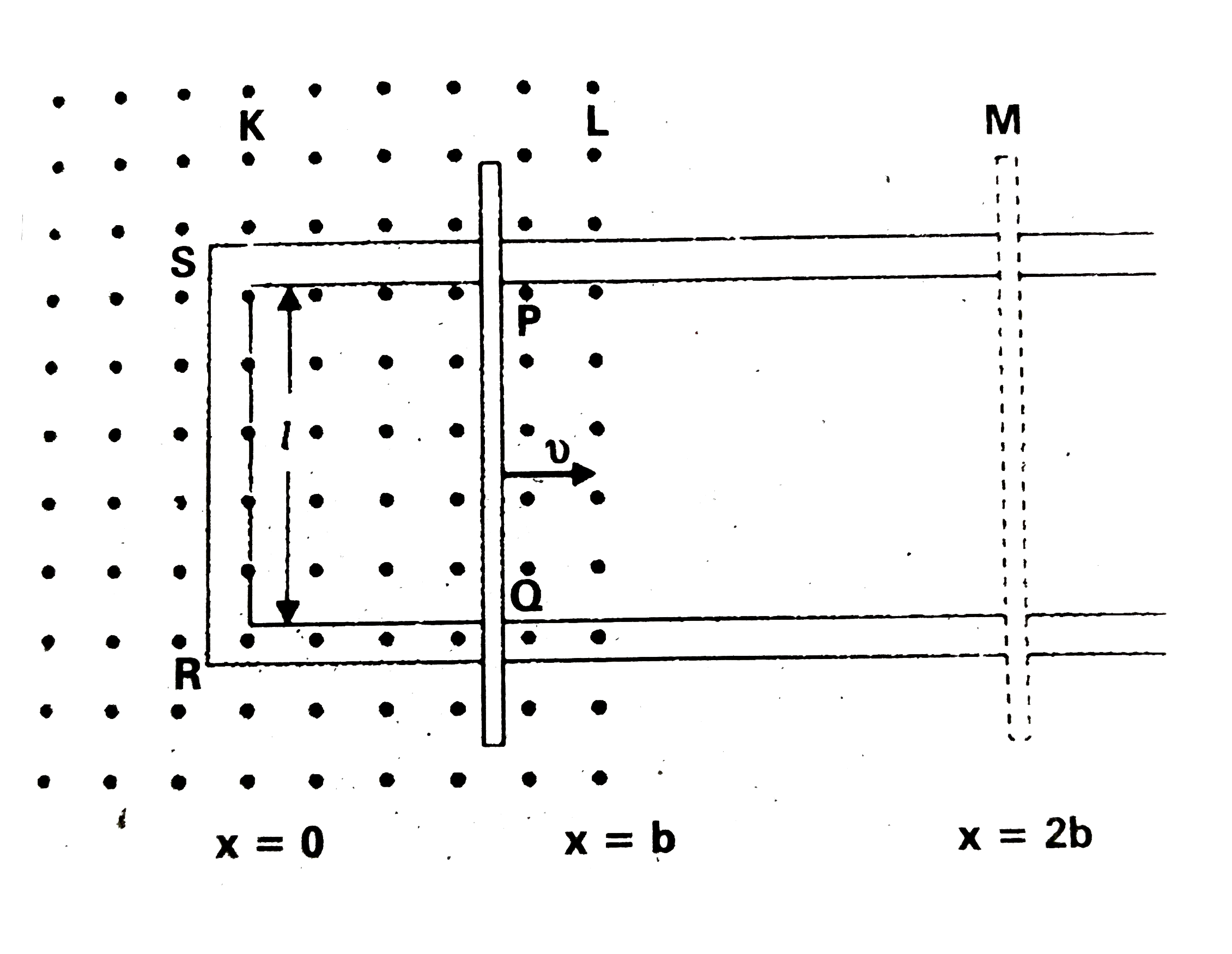 Solution in Telugu
Solution in Telugu
Let us first consider the forward motion from x=0 to x=2b. The flux ϕB linked with the circuit SPQR is
ϕB=Blx0≤x<b
=Blbb≤x<2b
The induced emf is
ε=−dϕBdt
=−Blv 0≤x<b
0 b≤x<
When the induced emf is non-zero, the current I is (in magnitude)
I=Blυr
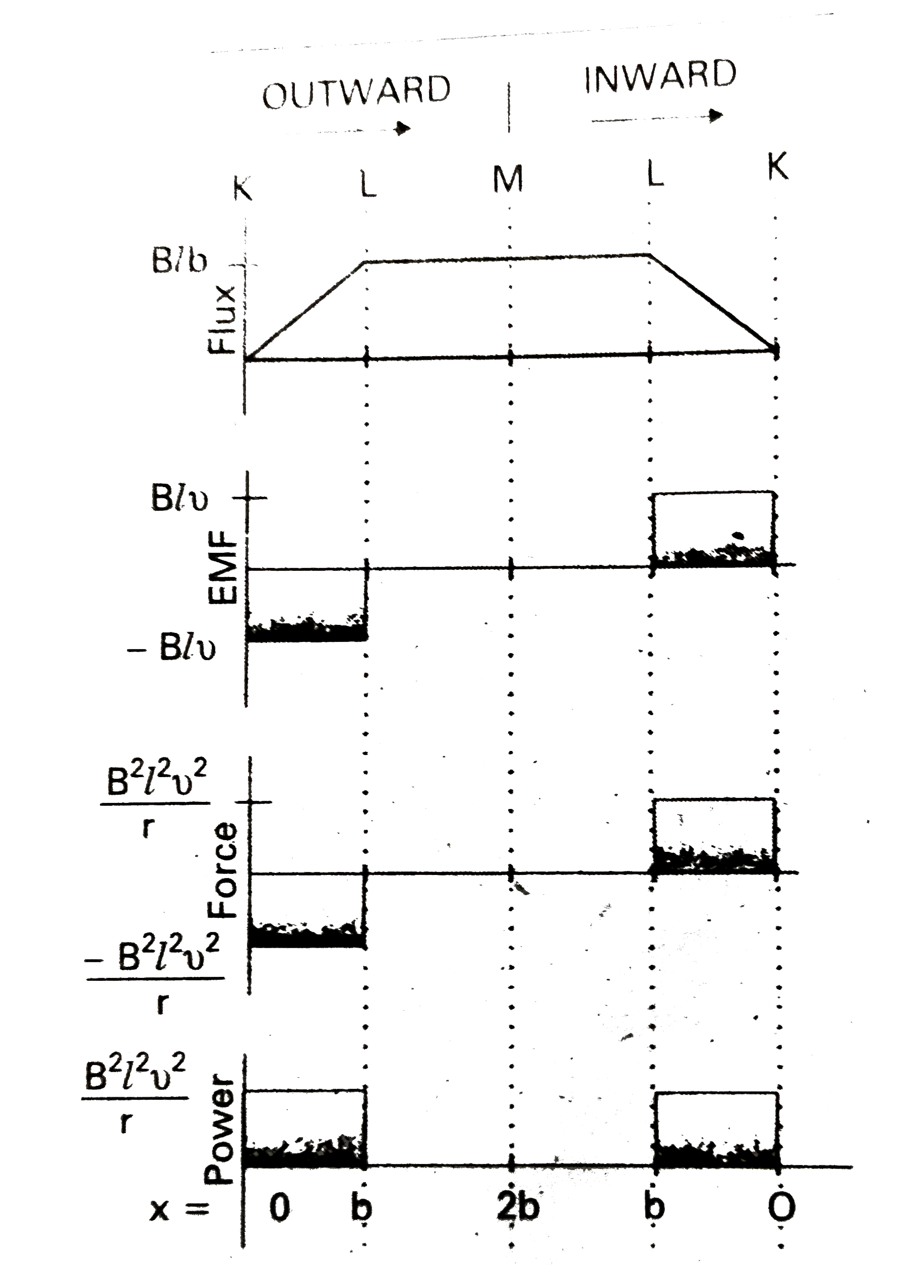
The force required to keep the arm PQ in constant motion is IlB. Its direction is to the left. In magnitude.
F=B2l2vr0≤x<b
=0 b≤x<2b
The Joule hearting loss is Pj=I2r
=B2l2v2r 0≤x<b
=0 b≤x<2b
One obtains similar expression for the inward motion from x=2b to x=0.
Topper's Solved these Questions
- BOOK - VIKRAM PUBLICATION ( ANDHRA PUBLICATION)CHAPTER - ELECTROMAGNETIC INDUCTION EXERCISE - Problems2videos
ELECTROMAGNETIC INDUCTION
- BOOK - VIKRAM PUBLICATION ( ANDHRA PUBLICATION)CHAPTER - ELECTROMAGNETIC INDUCTION EXERCISE - Very Short Answer Questions8videos
ELECTROMAGNETIC INDUCTION
- BOOK - VIKRAM PUBLICATION ( ANDHRA PUBLICATION)CHAPTER - ELECTRIC CHARGES AND FIELDSEXERCISE - DAM SURE LAQ1videos
ELECTRIC CHARGES AND FIELDS
- BOOK - VIKRAM PUBLICATION ( ANDHRA PUBLICATION)CHAPTER - ELECTROMAGNETIC WAVEEXERCISE - ADDITIONAL EXERCISES19videos
ELECTROMAGNETIC WAVE
Similar Questions
A wheel with 10 metallic spokes each 0.5 m long is rotated with a speed of 120 rev/min in a plane normal to the horizontal component of earth's magnetic field HE at a place. If HE 0.4 G at the place, what is the induced emf between the axle and the rim of the wheel ? Note that 1G=10−4T.
09:57View SolutionWhat did the experiments of Faraday and Henry show?
View SolutionState Gauss's law in electrostatics. Applying Gauss's law derive the expression for electric intensity due to an infinite plane sheet of charge.
19:33View SolutionSuppose that the electric field part of an electromagnetic wave in vacuum is E={(3.1 N/C) cos [(1.8 rad/m)y+{5.4×106 rad/s} t]} i.
What is the direction of propagation ?13:01View SolutionThe arm PQ of the rectangular conductor is moved from x=0, outwards in the uniform magnetic field which extends from x=0 to x=b and is zero for x>b as shown. Only the arm PQ possess substantial ressitance r. Consider the situation when the arm PQ is pulled outwards from x=0 to x=2b, and is then moved back to x=0 with constant speed v. Obtain expression for the flux, the induced emf, the force necessary to pull the arm and the power dissipated as Joule heat. Sketch the variation of these quantities with distance.
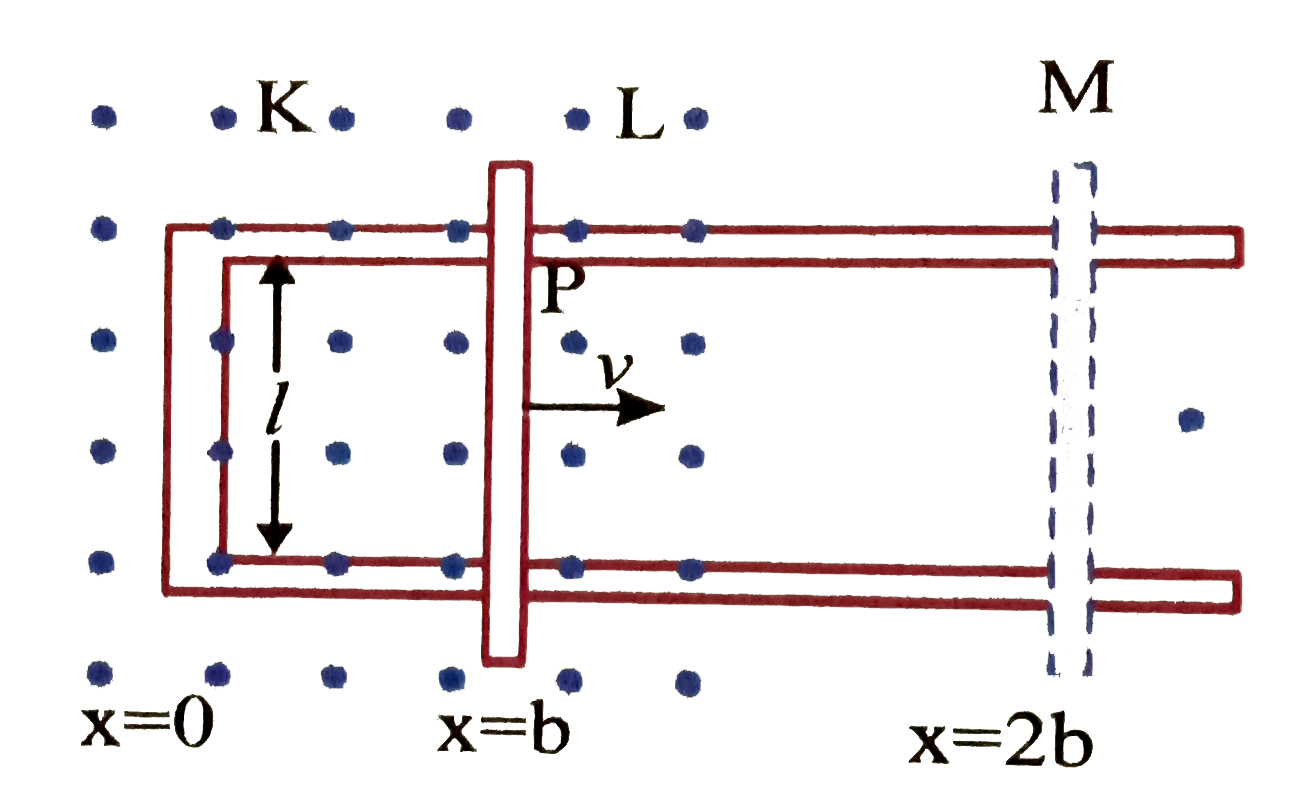 View Solution
View SolutionState Faraday's law of electromagnetic induction. Figure shows a rectangular conductor PQRS in which the conductor PQ is free to move in a uniform magnetic field B perpendicular to the plane of the paper.The field extends from x=0 to x=b and is zero for x gt b .Assume that only the arm PQ posses resistance r .When the arm PQ is pulled outward from x=0 with constant speed v , obtain the expressions for the flux and the induced emf. sketch the variations of these quantities with distance 0 le x le 2b .
08:07View SolutionThe arm PQ of the rectangular conductor is moved from x=0, outwards in the uniform magnetic field which extends from x=0 to x=b and is zero for x>b as shown. Only the arm PQ possess substantial resistance r. Consider the situation when the arm PQ is pulled outwards from x=0 to x=2b, and is then moved back to x=0 with constant speed v. Obtain expression for the flux, the induced emf, the force necessary to pull the arm and the power dissipated as Joule heat. Sketch the variation of these quantities with distance.
 08:07View Solution
08:07View Solutionचित्र 6.12 (a) को देखिए आयताकार चालक की भुजा PQ को x=0 से दायीं ओर चलाया जाता है एकसमान चुंबकीय क्षेत्र तल के लंबवत है तथा x=0 से x=b तक विस्तारित है तथा x>b के लिए शून्य है | केवल भुजा PQ में ही पर्याप्त प्रतिरोध r है | उस स्थिति की कल्पना कीजिए जब भुजा PQ को x=0 से x=2b तक, बाहर की ओर खिंचा जाता है तथा पुनः स्थिर चाल v से x=0 तक वापस ले जाते है | फ्लक्स, प्रेरित विधुत वाहक बल, भुजा को खींचने के लिए आवश्यक बल तथा जूल ऊष्मा के रूप में क्षयित शक्ति के लिए व्यंजक प्राप्त कीजिए | इन राशियों में दुरी के साथ होने वाले परिवर्तन का ग्राफ भी खींचिए |
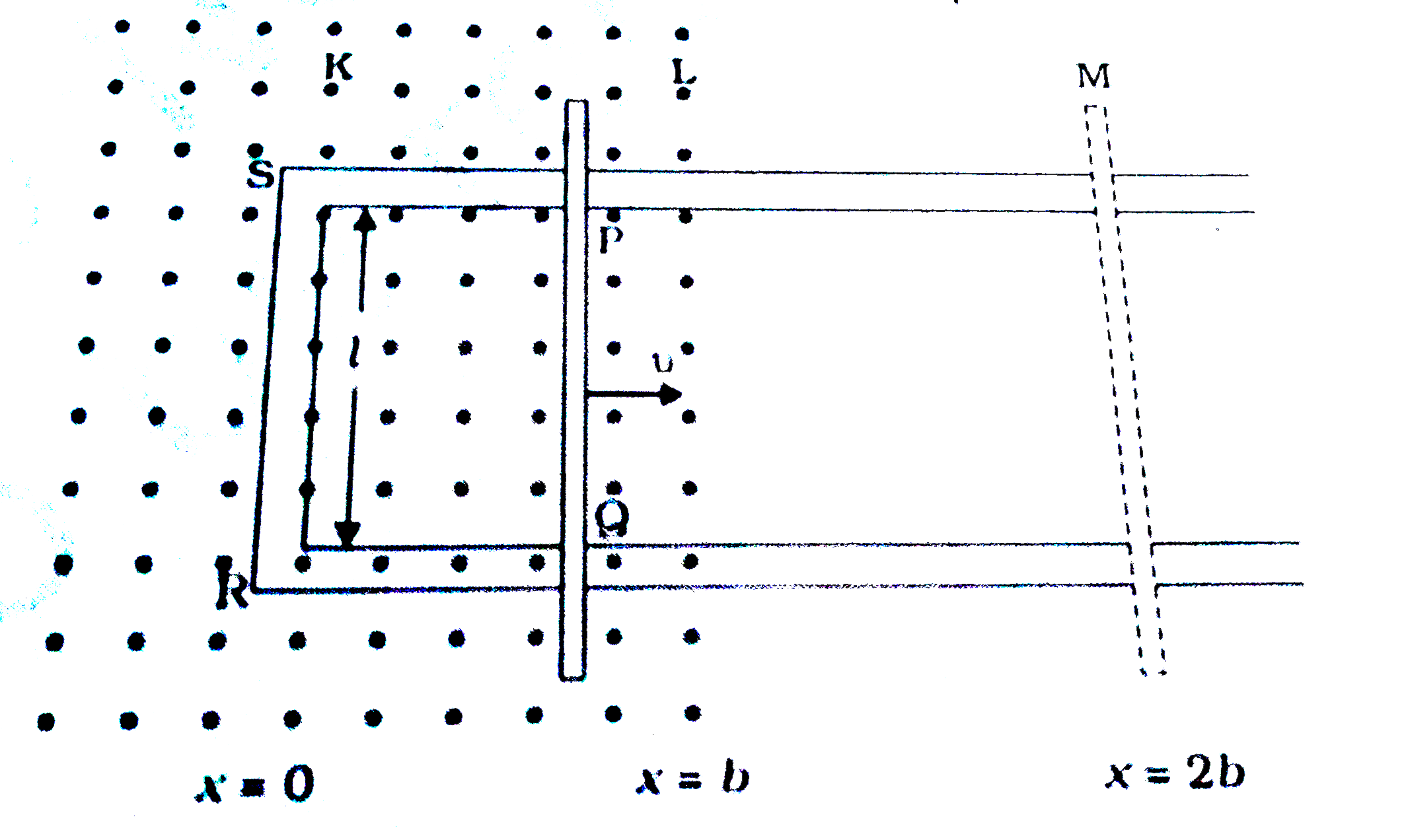 14:12View Solution
14:12View Solutionचित्र को देखिए।आयताकार चालक की भुजा PQ को x = 0 से दायीं ओर चलाया जाता है। एकसमान चुंबकीय क्षेत्र तल के लंबवत है तथा x = 0 से x = b तक विस्तारित है तथा x>b के लिए शून्य है। केवल भुजा PQ में ही पर्याप्त प्रतिरोध है। उस स्थिति की कल्पना कीजिए जब भुजा PQ को x = 0 से x = 2b तक बाहर की ओर खींचा जाता है तथा पुनः स्थिर चाल सेx = 0 तक वापस ले जाते हैं। फ्लक्स, विद्युत वाहक बल, भुजा को खींचने के लिए आवश्यक बल तथा जूल ऊष्मा के रूप में क्षयित शक्ति के लिए व्यंजक प्राप्त कीजिए। इन राशियों में दूरी के साथ होने वाले परिवर्तन का ग्राफ भी खींचिए।
View SolutionIn figure, the arm PQ is moved from x = 0 "to" x = 2b with constant speed V. Consider the magnet field as shown in figure. Write (i) direction of induced current in rod (ii) polarity induced across rod.
08:14View SolutionThe arm PQ of the rectangular conductor is moved from x=0, outwards. The uniform magnetic field is perpendicular to the plane and extends from x=0 to x=b and is zero for x>b. Only the arm. PQ possesses substantial resistance r. Consider the situation when the arm PQ is pulled outwards from x=0 to x=2b, and is then moved back to x=0 with constant speed v. Obtain expressions for the flux, the induced emf, the force necessary to pull the arm and the power dissipated as Joule heat. Sketch the variation of these quantities with distance.
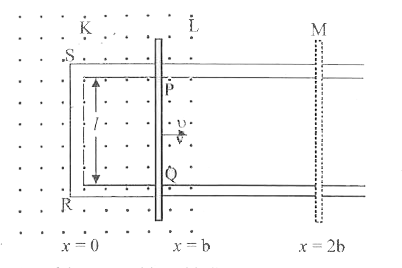 05:55View Solution
05:55View Solutionफैराडे के वैद्युतचुम्बकीय प्रेरण का नियम बताएँ। चित्र में एक आयताकार चालक PQRS दिखाया गया है जिसमें चालक PQ, पृष्ठ के तल पर लम्बवत एकसमान चुम्बकीय क्षेत्र B में चलने में स्वतन्त्र है। क्षेत्र x = 0 से x = b तक फैला है और x>b के लिए शून्य है। मान लें कि केवल भुजा PQ का ही प्रतिरोध r है। जब भुजा PQ, स्थिर वेग v से बाहर की ओर x = 0 से x = 2b तक खींच कर फिर x = 0 तक वापस लायी जाती है, तो फ्लक्स और प्रेरित विद्युत वाहक बल के लिए व्यंजक निकालें। इन राशियों दूरी के साथ परिवर्तन का चित्र बनाएँ।
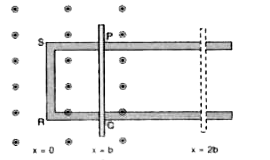 View Solution
View SolutionIn the following diagram, the arm PQ of the rectangular conductor is moved from x = 0 ,
outwards.
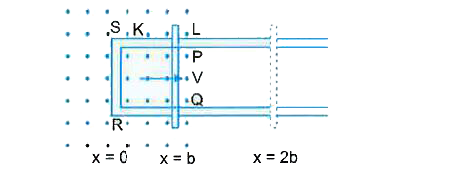
The unfirom magnetic field is perpendicular to the plane and extends from x=0 to x=b and is zero for x>b. Only the arm PQ possesses substantial resistance 'r'. Consider the situation when the arm PQ is pulled outwards from x = 0 to x = 2b, and then moved back to x = 0 with constant speed 'v'. Obtain expressions from the (i) magnetic flux, (ii) the induced emf, (iii) the force necessary to pull the arm and (iv) the power dissipated as joule heat.
Sketch the variation of these quantities with distance.View SolutionRefer to figure the arm PQ of the rectangular conductor is moved from x = 0, outwards. The uniform magnetic field is perpendicular to the plane and extends from x = 0 to x = b and is zero for x > b. Only the arm PQ possesses substantial resistance r. Consider the situation when the arm PQ is pulled outwards from x = 0 to x = 2b and is then moved back to x = 0 with constant speed v. Obtain expressions for the flux, the induced emf, the force necessary to pull the arm and the power dissipated as Joule heat. Sketch the variation of these quantities with distance.
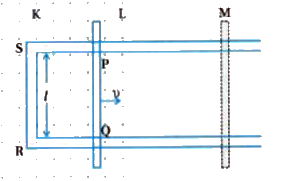 View Solution
View SolutionFigure shows a rectangular loop conducting PQRS in which the arm PQ is free to move. A uniform magnetic field acts in the direction perpendicular to the plane of the loop. Arm PQ is moved with a valocity v towards the arm RS. Assuming that the arms QR, RS and SP have negligible resistances and the moving arm PQ has the resistance r, obtain the expression for (i) the current in the loop (ii) the force and (iii) the power required to move the arm PQ.
 View Solution
View Solution

